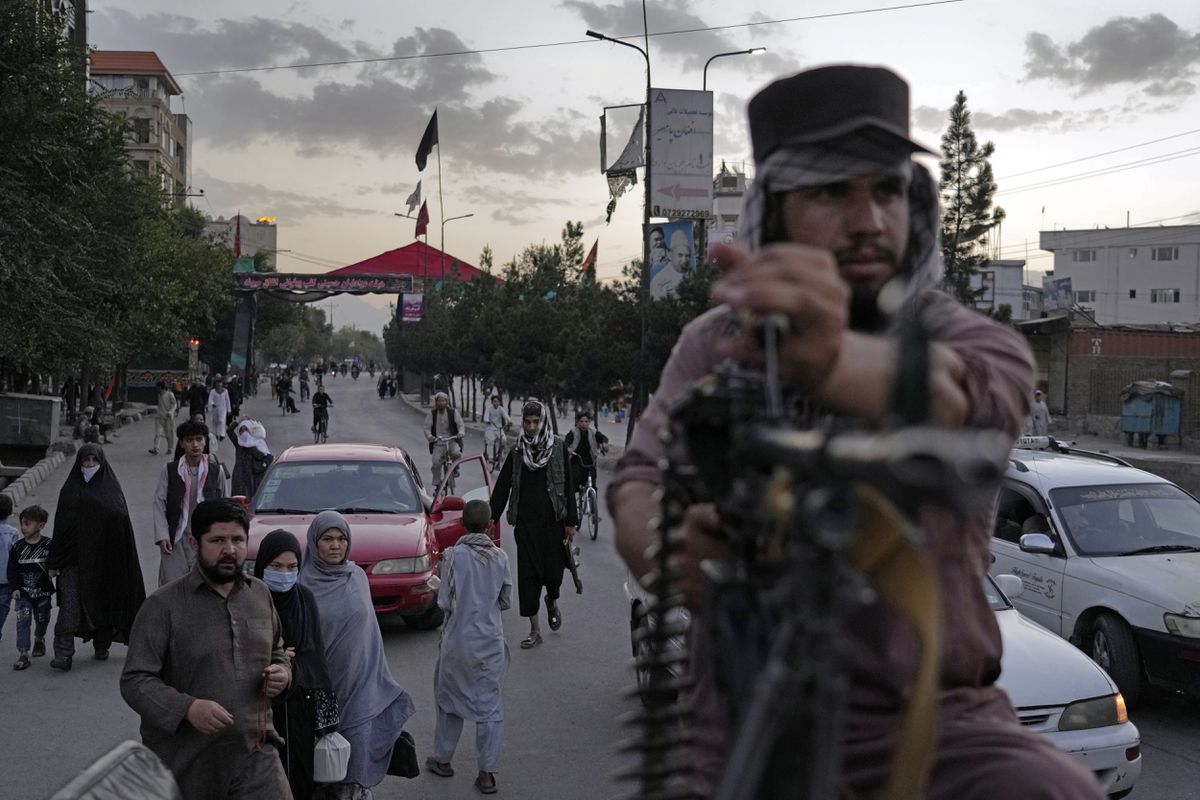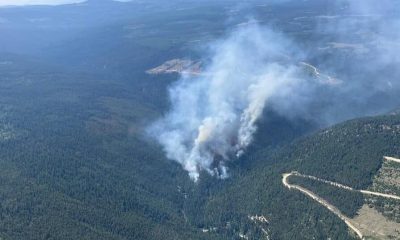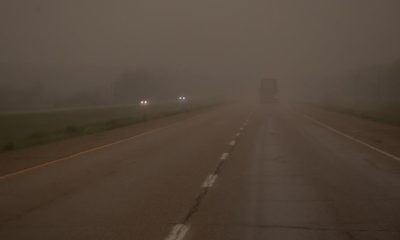Politics
Politics Briefing: One year after Afghanistan fell to the Taliban – The Globe and Mail

Friday’s Politics Briefing failed to deploy due to a programming error. We apologize for missing it.
Hello,
One year ago, Afghanistan was taken over by the Taliban. Since then, The Globe and Mail’s Janice Dickson has been writing about the challenges faced by Afghans trying to make their way to Canada, including through a special immigration program for Afghans who worked for Canada’s diplomatic and military missions in the country, along with their families.
Today, she brings the story of a young man named Usman and his father, who once guarded Canada’s embassy in Kabul. A week ago, Usman’s father made a rare trip outside their home to pick up some food – and has not returned. Usman fears the Taliban have taken his father and may be coming next for him and his family.
Usman said he has e-mailed Immigration, Refugees and Citizenship Canada (IRCC) countless times on his father’s behalf over the last year. So far, he has only received auto-replies.
In another story, Dickson, along with Goran Tomasevic and Sharif Sharaf, detail the struggles of Afghan girls and teachers at one school – after the Taliban banned schooling for girls after grade six. One 14-year-old girl said in a phone interview that she has always dreamed of a career in economics. But she’s in sixth grade and, in a few months, her education will come to an end.
“Maybe in three or four years I will also marry. I don’t know. This is a very awful thought for me. But it could be my future, like other women,” the girl said.
This is the daily Politics Briefing newsletter, written by Marsha McLeod, who is filling in for Ian Bailey. It is available exclusively to our digital subscribers. If you’re reading this on the web, subscribers can sign up for the Politics newsletter and more than 20 others on our newsletter signup page. Have any feedback? Let us know what you think.
TODAY’S HEADLINES
GOVERNANCE ISSUES KNOWN – Before Hockey Canada became engulfed in controversy this year over its handling of sexual-assault allegations, the government had concerns about its board of directors, including aspects of transparency and accountability within the organization, according to documents obtained by The Globe. Story here.
BLOCKADES COST BILLIONS – Newly-disclosed cabinet documents show that Ottawa produced an internal estimate in February of the GDP impact of countrywide blockades – figures Finance Minister Chrystia Freeland did not provide when asked during a June committee hearing. The estimate showed that the Canadian economy was losing between $2.6-billion and $5.2-billion a week. Story here.
ARRIVECAN GIVES ONE-TIME EXEMPTION – The Canadian government is allowing COVID-19-vaccinated travellers entering the country by land border a one-time exemption from quarantine, testing and fines if they fail to enter their information on the ArriveCan app. Story here.
STRUGGLES TO FIND A FAMILY DOCTOR – More Canadian seniors are finding themselves without a family doctor amid a shortage of primary-care physicians, compelling some older adults to seek private support as advocates highlight serious health consequences. Story here.
RUSHDIE ON ROAD TO RECOVERY – Author Salman Rushdie is “on the road to recovery,” his agent said Sunday, two days after he was stabbed ahead of delivering a lecture in upstate New York. Story by the Associated Press here.
POWER OUTAGE INVESTIGATED – The City of Toronto is investigating a power outage that left many in the downtown core without electricity for several hours on Thursday. Story by the Canadian Press here.
INDIGENOUS LANGUAGE EXEMPTION DISCUSSED – Senior civil servants discussed offering possible exemptions to federal employees who already speak one Indigenous language from having fluency in both English and French, according to new documents. Story by the Canadian Press here.
THIS AND THAT
The House of Commons is not sitting again until Sept. 19. The Senate is to resume sitting on Sept. 20.
MPs OFFER STATEMENTS ON AFGHANISTAN – Liberal MPs referred to the “hardships endured by the Afghan people, with some having undergone harrowing journeys to flee the country and countless others living in fear of persecution and retribution,” and highlighted the thousands of Afghans who have been brought to Canada. NDP MPs, meanwhile, brought up issues with the Liberal government’s program to bring Afghans to Canada who served with Canada’s diplomatic or military missions. “Instead of expediting processing, the Liberal government made the application process confusing and full of bureaucratic red tape,” their statement read. Conservative MPs said that “the Liberals failed to plan for an evacuation of our partners in Afghanistan and continue to struggle to provide thousands of Afghans safe entry into our country.”
NATIONAL ACADIAN DAY MARKED – Prime Minister Justin Trudeau issued a statement noting the day, writing, “Acadians have always shown courage, resilience, and perseverance. For more than 400 years in North America, they have built a strong and dynamic identity, which they have safeguarded in the face of adversity and hardship. This Acadian identity, deeply rooted in our history, inspires people far beyond the borders of Acadie.”
COMMITTEE MEETS ABOUT POSSIBLE INTERFERENCE – Tomorrow, the House standing committee on public safety and national security will meet for the second day of a study into “allegations of political interference in the 2020 Nova Scotia Mass Murder investigation.” They are set to hear from RCMP and Department of Justice officials. Hearing information is here.
THE DECIBEL
Why do CEOs get paid so much? David Milstead, The Globe’s institutional investment reporter, takes Decibel listeners inside the complex world of executive pay. Episode here.
PRIME MINISTER’S DAY
The Prime Minister is holding private meetings in the National Capital Region today.
LEADERS
No schedules provided for party leaders.
TRIBUTE
“Bill Graham was old school. The former Liberal cabinet minister loved politics, loved the Toronto riding he represented through five elections, loved being out and about in the world, loved gossip and good stories, which he could tell better than just about anyone,” wrote John Ibbitson in his obituary of the respected politician, who died last weekend. Obituary here.
OPINION
Mellissa Fung (Contributed to The Globe and Mail) on the fight to get Afghans out of the country, amid bureaucratic delays: “During those frantic first days and weeks of the Taliban’s return to Kabul, I made hundreds of calls, to people I knew and to people I didn’t. I wasn’t alone; journalists, aid workers and former military members the world over were similarly desperate to do what we could to evacuate those at risk. It seemed surreal that this work was left to us, but we found ourselves desperately trying to organize convoys and flights, and madly filling out spreadsheets for manifests.”
Rahela Nayebzadah (Contributed to The Globe and Mail) on Afghanistan’s descent into the ‘dark ages,’ a year after the West’s withdrawal: “Society needs to come together to support those the West left behind. Afghans in Western countries, especially, need to come together. We need to push political leaders into fighting for women’s rights in Afghanistan and accepting more refugees. Recently, Immigration, Refugees and Citizenship Canada announced that spots for the special Afghan immigration program are nearly full. Millions of Afghans will die at the hands of the Taliban if Western countries do not accept more refugees.”
Adnan R. Khan (Contributed to The Globe and Mail) on how Afghanistan is in a similar place as it was in the mid-1990s: “It truly has been a year of rude awakenings in Afghanistan. Since the Taliban conquered the country on Aug. 15 last year, the situation has devolved to a point where we are now seeing the re-emergence of an Afghanistan that existed in the mid-1990s: an emirate of fear where terrorist groups are again allowed to flourish and basic human dignity is denied to most of the population. That’s not what we were told would happen when the U.S. struck a deal with the Taliban that would allow it to end the longest war in U.S. history.”
Asuntha Charles and Reyhana Patel (The Hill Times) on the need for Canada to allow aid to flow to Afghanistan: “We have united in launching the ‘Aid for Afghanistan’ public campaign to remove these barriers, including the amendment of the Criminal Code, to allow humanitarian organizations to resume their programs. Ultimately, we want our government—and Canadians at large—to understand that this issue is not about the Taliban, religion, or party politics. It is about Afghanistan being on the brink of mass starvation, where 22.8 million people—through no fault of their own—are suffering and in desperate need of urgent help.”
Samra Habib (Contributed to The Globe and Mail) on partition’s ‘cruel legacy:’ “Many of us born after Partition have experienced intergenerational trauma. How does so much loss, fear, grief and disconnection manifest in the bodies and lives of the children, grandchildren and great-grandchildren of those who lost so much? It’s something I often wonder about as I try to unearth the origins of some of my own fears and anxieties. Hopefully, a surge in conversations around the impact of Partition, 75 years later, will help us examine what has been passed down to us.”
David Boyd, Kai Chan, Amanda Giang, and Navin Ramankutty (Contributed to The Globe and Mail): on the need for Canada to take action on the right to a healthy environment: “The world’s future became a little bit brighter recently. On July 28, for the first time in history, the United Nations General Assembly recognized that everyone, everywhere, has a right to live in a clean, healthy and sustainable environment. Now it’s time for Canada to step up and take action to ensure that right for all its citizens.”
Got a news tip that you’d like us to look into? E-mail us at tips@globeandmail.com. Need to share documents securely? Reach out via SecureDrop.
News
Speculation Grows Around Pennsylvania Gov. Josh Shapiro as Potential Running Mate for Kamala Harris

With President Biden ending his re-election bid, there’s growing chatter that Pennsylvania Gov. Josh Shapiro could be a potential running mate for Vice President Kamala Harris.
Why it matters: Shapiro, who’s positioned himself as a moderate Democrat, has many advantages for a national ticket, including representing a pivotal swing state that former President Trump’s campaign has indicated will be central to their campaign strategy.
The former state lawmaker and attorney general has decades of political experience, and some swing voters view Shapiro as Democrats’ next rising star.
The big picture: Shapiro is among several Democratic governors getting attention for the VP spot, as well as North Carolina Gov. Roy Cooper, Michigan Gov. Gretchen Whitmer, Illinois Gov. J.B. Pritzker, and Kentucky Gov. Andy Beshear.
Some Democratic officials and operatives have even floated Shapiro’s name as a presidential contender should delegates and party members decide Harris isn’t the strongest opponent to take on Trump. As of Sunday, no major Democratic lawmaker had indicated their intention to challenge Harris for the party’s nomination.
Reality check: Democrats are unlikely to leapfrog Harris in favour of another candidate for several reasons — including the millions of dollars held in the Biden-Harris war chest that could easily be given to her, but not to any other potential candidate.
Catch up quick: President Biden announced in a letter posted on his X account Sunday he’s stepping aside as the presumptive Democratic nominee for the 2024 presidential contest and endorsing Harris.
Biden, who has been in Rehoboth, Delaware, since last week recovering from COVID-19, faced intense pressure to withdraw from the race following his shaky debate performance on June 27 against Trump. Harris is emerging as the leading contender weeks before the Democratic National Convention on Aug. 19, but some advisers worry the VP’s record may not outweigh her years-long battle with public image and low favorability ratings, Axios’ Avery Lotz reports.
What they’re saying: “I will do everything I can to help elect Kamala Harris as the 47th President of the United States,” Shapiro said in a post on X Sunday.
“I’ve known Kamala Harris for nearly two decades — we’ve both been prosecutors, we’ve both stood up for the rule of law, we’ve both fought for the people and delivered results,” Shapiro wrote in a statement. “She has served this country honorably as Vice President and she is ready to be President.” When speculation was swirling before Biden stepped aside, Shapiro said he was committed to staying put as Pennsylvania governor.
His spokesperson Manuel Bonder told Axios earlier this month that any scenario of the governor replacing Biden or becoming Harris’ VP pick was “baseless speculation” and a “distraction” that doesn’t help Democrats “defeat Donald Trump at the ballot box.”
Zoom in: Shapiro, a first-term governor, has navigated the state’s divided government and could appeal to constituents in Philadelphia’s purple suburbs.
Shapiro has been outspoken about the ongoing war in Gaza and was credited for his leadership in getting I-95 reopened in less than two weeks after a deadly collapse.
Between the lines: St. Joseph’s professor emeritus and political commentator Randall Miller tells Axios that Shapiro is better off remaining at the helm in Pennsylvania and positioning himself to run in the next cycle. He could decimate future political prospects by joining a potentially “sinking ship.” “He’s very independent, very shrewd,” Miller said. “He has a controlled, directed ambition. He doesn’t need to do it.”
What’s next: Harris will not automatically pick up Biden’s delegates, meaning her road ahead has to focus on accumulating a majority at the DNC.
Politics
Kamala Harris: A California Political Odyssey
Politics
Is Ivanka Trump plotting a return to politics

If you’re a woman freaking out about the imminent possibility of another Trump term, don’t despair quite yet. Yes, Project 2025 is hoping to turn the US into a Christian nationalist country. Yes, JD Vance, Donald Trump’s running partner, has been primed for the job by Peter Thiel, a man who has mused that women having the vote is problematic. Yes, experts are raising the alarm that “a Trump-Vance administration will be the most dangerous administration for abortion and reproductive freedom in this country’s history.” But it’s not all doom and gloom: there may well be a beacon of light and female liberation coming into the White House as well. Signs suggest Ivanka Trump is considering a return to politics. Ladies and gentlewomen, the patron saint of female empowerment may selflessly serve us once again!
To be clear: the younger Trump hasn’t explicitly said that she’s interested in another go at being Daddy’s special adviser. In fact, she’s spent the last few years getting as far away from politics as possible. A renaissance woman, Trump has sold everything from handbags to shoes to real estate – but her most valuable product has always been herself. The former first daughter has always been very careful about protecting her personal brand. And, for a while, that meant staying well clear of her father.
With Donald Trump now formally the nominee, it can be hard to remember just how bad things looked for the former president a couple of years ago. After an underwhelming performance by GOP candidates in the 2022 midterm elections, a lot of Trump’s former acolytes started turning on him. High-profile Republicans complained that Trump was a drag on the party. Even the New York Post, once Trump’s personal Pravda, thought he was a joke: “TRUMPTY DUMPTY”, a post-midterm front page crowed. And then, of course, there were Trump’s mountains of legal problems. A lot of people wrote Trump off.
Ivanka was noticeably not by her father’s side during his hours of need. The moment that Donald got kicked out of the White House, Ivanka and her husband, Jared Kushner, followed him to Florida but kept a safe distance from the political goings on at Mar-a-Lago. Can’t have an insurrection ruining one’s image, after all.
A company called College Hunks Hauling Junk helped them clear out their DC mansion and the pair decamped to Miami’s “Billionaire Bunker”. They didn’t go empty-handed, of course. The couple reported between $172m and $640m in outside income while working in the White House and Saudi Arabia gave Kushner’s private equity firm $2bn to invest. Enough to keep them busy for a while.
For a long time, Javanka stayed fairly under the radar. Ivanka Trump would pop up in headlines now and again in Fun-loving Mother and Caring Philanthropist mode. Behold, a flattering headline about Ivanka helping deploy medical supplies and meals to Ukraine! Look: here’s an Instagram slideshow of the whole family skiing! Now here’s a fun picture of the Javanka family at the flashy Ambani wedding!
A cynic might say these carefully curated images were designed to humanize Trump and erase her messy political past. Aiding this was a consistent drip-drip of mysterious sources telling the press that Javanka had no desire whatsoever to return to politics. Even this year, when Donald Trump became the presumptive nominee, media “sources” kept insisting that the former first daughter wanted nothing to do with the White House. “She is very happy, living her best life,” a source told People in March. “She left politics totally in the rearview mirror and so this time around, even if her dad is the leading Republican candidate, she basically doesn’t care. She told him when he said he was going to run again that she didn’t want to be involved.”
Mary Trump, the woman who has made a career out of being Donald Trump’s disgruntled niece after a legal battle over her inheritance, has been blunt about why Ivanka seems to have retreated from politics. “I think Ivanka made very clear that she doesn’t get enough out of [her relationship with her father] any more,” Mary Trump told CNN at the end of May. “She’s barely been heard from for months; she could not be bothered to show up at [her father’s] trial [over falsifying business records].”
As the election inches closer, however, Ivanka seems to have reassessed the value of her relationship with her father. In early May, the media outlet Puck reported that she was “warming to the idea of trying to be helpful again … She’s not like ‘Hell no’ any more”. A similar report from Business Insider soon followed: according to a “friend of Ivanka”, the entrepreneur wasn’t ruling politics out. A spokesperson for the couple told Puck that this was all nonsense but rumours of a political comeback kept mounting.
Then, a couple of weeks ago, Ivanka jumped back into the spotlight with an appearance on Lex Fridman’s highly influential podcast. (Fridman has more than 4 million subscribers on YouTube.) In this she opened up about how working at the White House was “the most extraordinary growth experience of my life” and how privileged she was to have been asked by her father to help so many people. During the conversation, she also carefully recapped some of (what’s she’s claimed as) her key achievements in the White House, such as boosting the child tax credit. It wasn’t so much an interview as it was a hype project by a friend. It felt lot like it was teasing Trump’s return to political life should her dad be re-elected.
So, after years in the Floridian wilderness, has the Maga Princess officially returned to the family fold? It’s a tad too early to tell but it increasingly looks that way. As one would expect, Trump has spent the last few days close to her father after the attempt on his life: she’s very much thrown herself into the role of doting daughter again.
And while Ivanka has been absent from the Republican national convention so far, she and Jared are expected to be at Donald’s side on Thursday when he formally accepts the party’s nomination. And if that happens and images of Ivanka standing next to her father hit the headlines, it won’t just be a celebratory photoshoot – it’ll be a preview of Trump’s second term.

-

 News5 hours ago
News5 hours agoAfter grind of MLS regular season, Toronto FC looks forward to Leagues Cup challenge
-

 News11 hours ago
News11 hours agoOntario expanding access to RSV vaccines for young children, pregnant women
-

 News19 hours ago
News19 hours agoCanadaNewsMedia news July 26, 2024: B.C. crews wary of winds boosting wildfires
-

 News6 hours ago
News6 hours agoIn President Milei’s sit-down with Macron, Argentina says the leaders get past soccer chant fallout
-

 News20 hours ago
News20 hours agoFrench train lines hit by ‘malicious acts’ disrupting traffic ahead of Olympics, rail company says
-

 News13 hours ago
News13 hours agoFederal grand jury charges short seller Andrew Left in $16M stock manipulation scheme
-

 News19 hours ago
News19 hours agoPeople should stay inside, filter indoor air amid wildfire smoke, respirologist says
-

 News18 hours ago
News18 hours agoDominant US basketball, soccer teams driving high betting interest on Olympics































